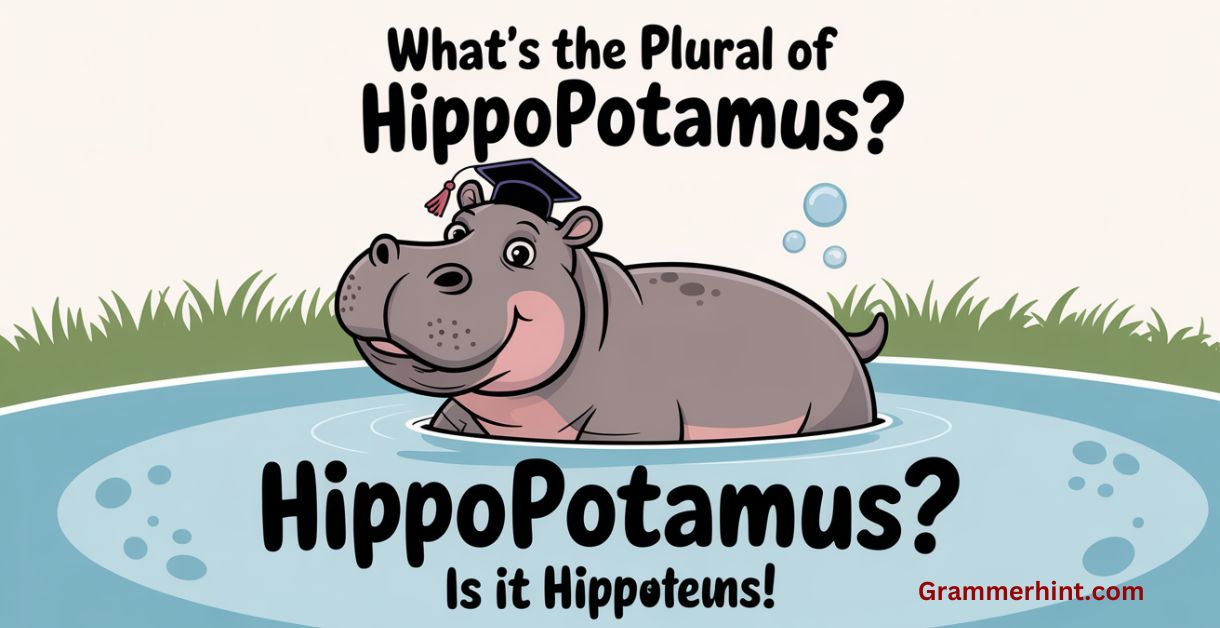Have you ever paused mid-sentence, wondering what is the plural of hippopotamus? Maybe you’re drafting an email, writing a school paper, or just chatting with a friend about wildlife.
The word “hippopotamus” itself is a mouthful, and its plural forms often confuse even native English speakers. So, should you say hippopotamuses or hippopotami? Or maybe just hippos? Let’s dive into the fascinating world of this large mammal from Africa and explore its pluralization, biological traits, habitats, and more.
The Etymology of “Hippopotamus”
Before we tackle the plural forms, understanding the word’s origin helps clarify why multiple versions exist. The term “hippopotamus” traces back to Greek—from the words hippos meaning “horse” and potamos meaning “river.” This literally translates to river horse, reflecting its preference for water-rich environments.
Later, the word passed into Latin, adapting its form before becoming part of the English vocabulary. Because of this journey through multiple languages, different pluralization patterns evolved.
What’s the Plural of Hippopotamus? Multiple Accepted Forms
When you ask, what’s the plural of hippopotamus, there’s no single correct answer. English, being a living and evolving language, accepts several plural forms:
- Hippopotamuses — The most common plural in modern English.
- Hippopotami — A Latin-influenced plural form, less common but still valid.
- Hippos — The casual, shortened plural of the synonym hippo.
Let’s explore each of these with real-world examples.
Hippopotamuses Plural: The Common English Plural
Most English speakers say hippopotamuses when referring to more than one of these hefty creatures. It follows the standard English pluralization rule of adding “-es” to words ending in “-us.” This approach is familiar and straightforward.
Scenario Example:
Imagine Sarah, a wildlife researcher, writing to her team:
Subject: Observations on Hippopotamuses in the National Park
Hi Team,
During our latest expedition, we spotted several hippopotamuses along the riverbank. Their behavior has shifted noticeably in response to the increased presence of tourists. Let’s discuss this during tomorrow’s meeting.
Cheers,
Sarah
In this email, “hippopotamuses” fits perfectly, maintaining clarity and formality. It’s the plural form most readers will recognize without hesitation.
Hippopotami: The Latin Plural Form
You might also encounter hippopotami, especially in more formal or academic contexts. This form borrows from Latin pluralization rules, which apply to some English words ending in “-us,” like cactuses/cacti or octopuses/octopi.
Scenario Example:
Professor James is preparing his lecture on animal group names and writes a note:
Note:
The plural forms of “hippopotamus” include hippopotami, reflecting the word’s Latin roots. While less common in everyday speech, this form appears in classical zoological texts.
While correct, “hippopotami” sounds more scholarly and less natural in casual conversation.
Hippos: The Casual, Everyday Term
In informal settings, most people shorten hippopotamus to hippo. Consequently, the plural becomes hippos. It’s friendly, quick, and widely understood, especially in contexts like safaris, zoos, or wildlife documentaries.
Scenario Example:
Jessica emails her friends about her trip to Africa:
Hey guys,
I finally saw the famous hippos chilling in the river at the national park. They’re huge and surprisingly fast! I’ll share pictures soon.
Cheers,
Jessica
Plural of Hippo vs. Hippopotamus: What’s the Difference?
You might wonder why the difference between plural of hippo and plural of hippopotamus matters. Essentially, “hippo” is a short form/synonym used in everyday language, while “hippopotamus” is the formal term, often preferred in scientific or educational contexts.
Using “hippos” is like saying “dogs” instead of “canines” or “cats” instead of “felines.” Both are correct; it just depends on your audience and tone.
Exploring English Grammar Plural Forms vs. Latin Pluralization Rules
English tends to add “-s” or “-es” to form plurals. However, words borrowed from Latin or Greek often retain their original plural forms, which can puzzle learners.
Take these examples:
| Singular | English Plural | Latin/Greek Plural |
|---|---|---|
| Hippopotamus | Hippopotamuses | Hippopotami |
| Octopus | Octopuses | Octopi |
| Cactus | Cactuses | Cacti |
Notice the pattern? Some forms, like hippopotamuses, feel more “English,” while hippopotami reflects linguistic heritage.
Biological and Behavioral Characteristics of Hippos
Knowing about the animal itself can help you appreciate why people care about its plural. Hippos are large herbivorous mammals with a barrel-shaped body designed for life spent mostly in water.
They thrive in rivers and lakes across Africa, making them some of the most interesting water-dwelling animals around. Despite their bulky appearance, hippos show remarkable agility in the water. They are also known for their territorial behavior and aggression, especially during mating seasons.
Habitat and Environment Preferences of Hippopotamuses (Animal Species)
Hippos need a special environment. They spend most of their days submerged in cool water to keep their massive bodies from overheating under the African sun. At night, they venture out to graze on grasslands, their primary food source.
You can find these majestic creatures in:
- Rivers that flow through the national parks of Africa.
- Zoos, where conservationists study and protect them.
- Remote wetlands and freshwater lakes.
Collective Nouns: What’s the Collective Noun for Hippos?
Did you know groups of hippos have unique collective nouns? One charming example is a bloat of hippopotamuses. Yes, a “bloat.” Imagine a group of these hefty animals lounging together—that’s a bloat.
Other animal groups have similar quirky names:
- A prickle of porcupines.
- A murder of crows.
- A pod of dolphins.
Collective nouns add character to how we talk about animals.
Hippos and Tourists: Interaction in the Wild
When tourists visit the wild habitats of hippos, encounters can range from awe-inspiring to downright dangerous. Hippos don’t take kindly to intruders near their river homes.
Here’s a cautionary email from a park ranger, Mike, to new guides:
Subject: Safety Briefing – Hippos in the Wild
Team,
Remember, hippos in the wild are highly territorial. Approaching a bloat can provoke aggressive behavior. Always keep a safe distance and remind tourists to stay in designated viewing areas near the river.
Regards,
Mike
Hippos in Zoos and National Parks: Conservation and Habitat Protection
As aquatic mammals face threats like habitat loss and pollution, environmentalists and conservation groups work tirelessly to protect their homes. Many hippos now live in carefully maintained zoos or national parks, where they receive care and education is promoted.
For example, a fundraising email might read:
Subject: Help Us Protect Hippopotamuses’ Natural Habitat
Dear Supporter,
Our mission is to conserve hippopotamuses (animal species) and their fragile river ecosystems in Africa. By donating, you help fund habitat restoration and anti-poaching efforts. Together, we can ensure future generations see these magnificent herbivorous mammals thrive.
Thank you,
The Wildlife Conservation Team
The Historical Context: Ancient Civilizations and Rock Paintings
Interestingly, hippos have appeared in human history for millennia. Ancient Egyptians revered the river horse in their myths and art. They even left behind rock paintings depicting these creatures, showing their long-standing relationship with humans.
This historical evidence suggests the importance of hippos not just ecologically but culturally.
Summary Table: Plural Forms and Usage
| Plural Form | Context | Example Usage |
|---|---|---|
| Hippopotamuses | Standard English plural | “We saw many hippopotamuses today.” |
| Hippopotami | Formal, Latin-influenced plural | “The hippopotami exhibit unique behaviors.” |
| Hippos | Casual, conversational | “Look at those hippos swimming!” |
Final Thoughts: Which Plural Should You Use?
The short answer: Use hippopotamuses for formal writing, hippos for casual talk, and hippopotami if you want to sound scholarly or historical.
Remember, language is fluid. You can even mix them within the same conversation to suit your style and audience.









